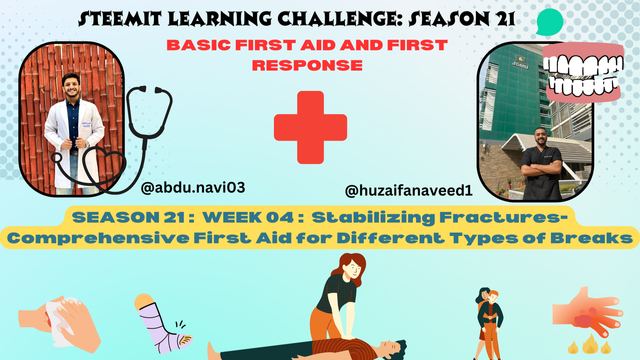SLC S21 Week 4 || Stabilizing Fractures- Comprehensive First Aid for Different Types of Breaks [SUMMARY]

The fourth week of the First Aid course has come to an end. First of all, I’d like to inform you all about the ongoing internet crisis in Pakistan. Since yesterday, we’ve been experiencing a mass countrywide internet outage due to political unrest, which has significantly impacted online work. No links are being uploaded, no pictures can be sent, and even social media platforms like Instagram and WhatsApp are not functioning. It feels as though we’ve been thrown back to the stone age.
Amid all this, the work must go on. This week, discussed , in detail, the study of fractures and their management. We explored the different types of fractures in detail and the mechanisms involved in treating them. Our goal is to present this course in the simplest terms possible, with a practical approach, so that if any of you ever encounter such situations, the solution will be just a click away.
The foremost and most crucial step in dealing with any trauma is First Aid Management and adhering to the Trauma Protocol. We emphasized the importance of prioritizing your own safety first before managing a case of fracture.
The next step involved understanding the details of stabilizing a fracture. As part of this, we assigned students practical tasks, such as applying splints and slings, and demonstrating each step carefully.
Before moving on to the statistics, I’d like to address a pattern that has concerned me over the past four weeks. Some students, whom I will not name to protect their privacy, consistently submit their assignments at the eleventh hour. These particular submissions contain all the details we are looking for, even including the points we mention in the comments or remarks on other students’ assignments earlier in the week. This has led me to suspect there might be some unfairness towards those who submit their assignments earlier.
It’s hard to explain how these late submissions so perfectly align with the feedback we’ve provided to others. However, I have not reached a final conclusion and will give the benefit of the doubt for now.
Now, let’s move on to the statistics:
Statistics |
|---|
This week, we had a total of eleven entries. I firmly believe in quality over quantity. Students often avoid courses with practical tasks, as such assignments demand more effort. However, those who choose these challenging tasks gain valuable, real-life, life-saving skills. These experiences not only enhance their knowledge but also prepare them for real-world scenarios, making their learning truly impactful.
| Total number of entries | Invalid entries | Plagiarized content |
|---|---|---|
| 11 | 1 | 0 |
Out of these 11 entries, 4 users had an Excellent approach, 3 students had a Good approach, while 3 users had an average approach.
| 8 or above | 6 or above | Below 6 |
|---|---|---|
| 4 | 3 | 3 |
Winners |
|---|
The top 4 users from this week's course are:
| Position | Username | Blog | Score |
|---|---|---|---|
| 1) | @rossnenye | link | 9.6 |
| 2) | @adese | link | 9.3 |
| 3) | @xkool24 | link | 9 |
| 4) | @pea07 | link | 8.9 |
Conclusion |
|---|
As an ending note I'd just like to encourage users to take these courses as something that will teach them useful information about unwanted situations. No one wants to fall sick or get into accidents but these are some things that we cannot avoid so the best course of action is to be prepared for it.
I truly appreciate your participation and patience throughout the course. Please keep us in your thoughts and prayers, and I hope you carry forward the knowledge gained here in your future endeavors. Thank you!
Thank you
Regards,
Dr @huzaifanaveed1
Dr @abdu.navi03
Wow, thank you so much.
I'm happy to be mentioned here again. My sincere appreciation to the team, and congratulations to all co-winners.